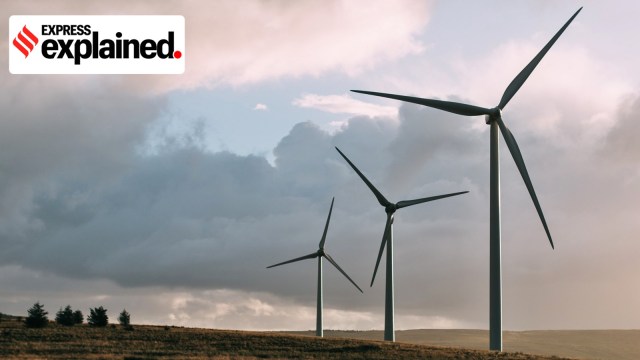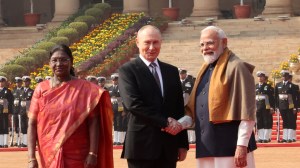Adani Group withdraws from wind power project in Sri Lanka: All you need to know
Adani's Sri Lanka Wind Power Project: Ever since news of the project broke in 2022, many in Sri Lanka criticised it and claimed it had not been awarded through a transparent process.
 Apart from the awarding process, some locals protested the project’s ecological impact on the region. (Via Pixabay/representational)
Apart from the awarding process, some locals protested the project’s ecological impact on the region. (Via Pixabay/representational)Adani’s Sri Lanka Wind Power Project Withdraw Explained: The Adani Group on Wednesday (February 12) withdrew from a proposed wind power project in Sri Lanka, with the company writing a letter to Sri Lanka’s Board of Investment. Adani Green was earlier set to invest over $440 million in a 20-year agreement for developing wind power in northern Sri Lanka’s Mannar town and the Pooneryn village in Killinochi district.
However, the project also attracted criticism from the Opposition parties in Sri Lanka, and from some locals, after it first came to light in 2022. The Chairman of Sri Lanka’s Ceylon Electricity Board (CEB), M M C Ferdinando, had alleged before a Sri Lankan parliamentary panel that Prime Minister Narendra Modi had “pressured” then President Gotabaya Rajapaksa to award a power project to the Adani Group. He later retracted the statement and resigned.
Several petitioners also challenged the project approval in the Sri Lankan Supreme Court. Here is what to know.
What was the Adani wind project in Sri Lanka?
With a total capacity of 484 megawatts, the project came amid a push towards renewable energy in the island nation. It also followed the Adani Group bagging a major infrastructure contract. In 2021, the Adani Group announced it would develop and run the strategically significant Western Container Terminal of Colombo Port, holding a 51 percent stake.
The conglomerate’s Chairman Gautam Adani also visited the country the same year to discuss investment opportunities, with some wind farms already operational in northern Sri Lanka.
Why was the project criticised?
News about an MoU for the wind project emerged in 2022, under then-President Gotabaya Rajapaksa. Details of the signing were not made public and were first reported by the newspaper Sunday Times, raising criticism in the country over the opaque process.
Appearing before a parliamentary panel in Colombo, CEB Chairman Ferdinando claimed that during his conversation with Rajapaksa, the President had told him that Modi had pressured him to award the project to the Adani Group. But he withdrew his statement a day later, claiming he had become “emotional” due to some of the questions he was asked. Rajapaksa said in a post on X, “I categorically deny authorisation to award this project to any specific person or entity.”
The Adani Group spokesperson issued a statement too, saying, “Our intent in investing in Sri Lanka is to address the needs of a valued neighbour. As a responsible corporate, we see this as a necessary part of the partnership that our two nations have always shared”. Another aspect under the scanner was the pricing system. Petitioners argued that the agreed tariff of $0.0826 per kilowatt-hour (kWh) that the government planned to pay would be a loss to Sri Lanka and should be lowered to $0.005 per kWh.
Apart from the awarding process, some locals protested the project’s ecological impact on the region. CEB unions had also protested, saying the government must award contracts only after following the competitive bidding process”. The events unfolded shortly after protests began against the Rajapaksas over the financial crisis that gripped Sri Lanka.
Gotabaya was ousted from power and fled the country, which led to Ranil Wickremesinghe assuming the presidential post. It was under his government that the Power Purchase Agreement was signed in 2024.
What happened under the new government?
With the election of Anura Kumara Dissanayake as President in September 2024, a review of the project appeared likely. Before the polls, he said he would “definitely cancel” the project “as it threatens our energy sovereignty”.
In January, the Sri Lankan government said it had appointed a committee to examine renegotiating the agreement. Government spokesperson Nalinda Jayathissa said, “There was no decision to cancel the Mannar and Pooneryn projects, but rather to appoint a committee to review them. The committee has started its work, and once the review is complete, we will determine what changes need to be made.”
In the Adani Group letter on Wednesday, the company said, “Our executives recently had discussions with CEB (Ceylon Electricity Board) officials as also with Ministry officials at Colombo. It was learnt that another Cabinet appointed negotiations committee (CANC) and Project Committee (PC) would be constituted to renegotiate the project proposal.”
“This aspect was deliberated at the Board of our company and it was decided that while the company fully respects the sovereign rights of Sri Lanka and it’s choices, it would respectfully withdraw from the said project,” the letter said.
- 01
- 02
- 03
- 04
- 05






































